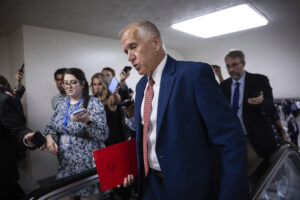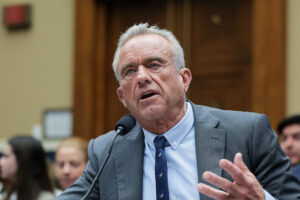Congress
How the GOP took back the Senate — even while continuing to struggle in swing states

Republicans celebrated as they took a decisive Senate majority last week: They’d finally figured out how to get past the candidate quality issues that had tanked them for two cycles.
But they still have a purple-state problem.
Even as President-elect Donald Trump swept every swing state, four of those battlegrounds are sending Democrats to the Senate. That’s the highest number of Senate-presidential ticket splits in 12 years, and a warning sign for Republicans as they try to protect and grow their ranks in 2026.
That 53-seat majority will be a boon to the GOP agenda next year. But three of Republicans’ wins were in solidly red seats in West Virginia, Ohio and Montana. They flipped a true swing state in Pennsylvania but suffered losses in Michigan, Wisconsin, Nevada and Arizona. That means they’ll fall well short of the 57 seats they might have had, thanks to undervoting, smaller Trump coattails and well-funded and disciplined Democratic opponents.
This was the fourth straight cycle in the Trump era that Senate Republicans struggled to win purple states. In theory, Trump could have pulled some of their top recruits over the finish line — he outperformed Senate GOP candidates in every single battleground state.
“Going into this there was a whole lot made out of the fact that Republican Senate candidates were running behind Trump,” said Steven Law, president of the GOP super PAC aligned with Senate leadership. “The easiest and clearest and most accurate explanation of that was that they were running against name brands who had huge advantages of incumbents.”
Both parties will heavily scrutinize the campaigns and their results — including Republicans’ ouster of incumbent Democratic Sen. Bob Casey in Pennsylvania — as they try to figure out how to compete during a second Trump administration. The good news, said Jason Thielman, executive director of the Senate GOP campaign arm, is Republicans will be better able to fully turn their attention to swing states now.
“Fast forward into future cycles, instead of having to spend so much money trying to unseat these Democrats in red states,” he said, “we’re now going to be able to focus all of our energy and resources on these purple, swing states.”
The midterms are historically difficult for the party of a sitting president. Controlling for candidate quality likely won Republicans the Senate this time, but it wasn’t enough to run the table. Heading into 2026, they will have to replicate their primary intervention strategy while also figuring out how to propel those candidates to victory in swingy states.
And Republicans had to scheme intensely against members of their own party to ensure victory in states that Trump won handily, underscoring the precarious position in which they find themselves. If left unchecked, their base will often elevate controversial candidates, like Kari Lake, who lost a second consecutive statewide run in Arizona.
Montana Sen. Steve Daines, who became chair of the Senate GOP campaign arm in 2022, decided to tackle that issue head-on.
“He focused on getting quality candidates, making sure they actually got the nomination, Senate Minority Leader Mitch McConnell said Wednesday. “And as I said, to some criticism, candidate quality is absolutely essential.”
Avoiding messy primaries
Daines gathered his top aides in December 2022 for an hours-long strategy session on a crucial question: How could they avoid botching a third attempt in a row to capture the majority?
The past two cycles haunted them. In 2020, the GOP lost its majority. Two years later, tarnished Republican nominees flubbed winnable races from Arizona to Georgia to Pennsylvania. This year, they needed to net only two seats to guarantee the majority, and they had a clear path.
Huddled in the National Republican Senatorial Committee’s Capitol Hill headquarters, Daines’ team landed on a plan. They would aggressively intervene in primaries, recruiting strong contenders and clearing the field for them as much as possible.
Daines publicly spoke out against problematic candidates who were considering runs, such as Doug Mastriano in Pennsylvania and former Milwaukee County Sheriff David Clarke. And national Republicans moved to block others, including the 2018 candidates who lost to Sens. Joe Manchin in West Virginia and Jon Tester in Montana.
McConnell personally visited West Virginia to court Gov. Jim Justice, a popular Democrat-turned-Republican who the GOP believed would spook Manchin out of the race. And in the strategy session at the NRSC, Daines came up with a recruiting suggestion for his home state of Montana: former Navy Seal Tim Sheehy.
Daines also curried favor with Trump, becoming the first member of Senate GOP leadership to endorse his 2024 run. He lobbied Trump to back his preferred Senate picks, including Justice and Sheehy, giving them priceless currency in their primaries. Trump was crucial in clearing what could have been messy fields, including in Michigan, where a GOP primary candidate dropped out on stage at a Trump rally and endorsed the party pick.
The NRSC also needed to contend with other party groups — especially the anti-tax Club for Growth, a conservative organization known for antagonizing the party establishment in key primaries. Reps. Alex Mooney (R-W.Va.) and Matt Rosendale (R-Mont.) were two of their favorites and both were considering Senate runs.
The NRSC endeared itself to the Club when it intervened to reduce primary competition for GOP Rep. Jim Banks, whom the Club backed for an open Senate seat in deep-red Indiana.
Daines met with former Gov. Mitch Daniels, a centrist considering a run, and told him he would not endorse him in the primary, according to a person familiar with the meeting. Daniels decided to sit out the race.
“That probably was the early indication to us that we could work closely with him,” Club for Growth President David McIntosh said of Daines.
The group ultimately did not seem eager to oppose Daines’ picks. It committed $10 million to help Mooney in West Virginia but spent just a small portion of that. McIntosh said donors had second thoughts after it became clear that Mooney could not beat Justice.
In Montana, Rosendale spent months talking about running for Senate, worrying national Republicans who saw him flop in 2018.
McIntosh urged him to stay in the House. Daines had also tried to keep Rosendale at bay, and he sought Trump’s endorsement for Sheehy — which landed just hours after Rosendale launched his bid. Days later, Rosendale dropped out.
The result: no internecine brawls in either state, both of which they handily picked up last week.
Other pickups came in Ohio and Pennsylvania. Republican Dave McCormick, who had lost a Pennsylvania Senate primary in 2022, had no primary competition this time. Last week, he scored a shocking upset against Casey, who the Associated Press said was ousted by just a fraction of a percentage point.
A continued struggle in the battlegrounds
But McCormick’s battleground win was an anomaly.
Sens. Tammy Baldwin (D-Wis.) and Jacky Rosen (D-Nev.) and Reps. Elissa Slotkin (D-Mich.) and Ruben Gallego (D-Ariz.) won even as Trump swept their states.
Two major reasons: Trump voters splitting their tickets for Democratic Senate candidates or skipping the Senate races entirely.

Polls had shown for months that ticket-splitting could aid Democrats in tough races, and many of them ran campaigns to win over Trump voters. Democratic Senate candidates ended up running at least a bit ahead of Harris, while Republicans fell behind Trump.
“Rather than defining the terms of the race or our opponents around partisanship or anything related to the top of the ticket, we built a case against each Republican that was unique to them,” said Christie Roberts, the executive director of the Democratic Senatorial Campaign Committee.
In Arizona, Gallego campaigned at rodeos, barbeques and boxing gyms to pull in Latino voters who were supporting Trump.
In Michigan, Slotkin, a Jewish ex-CIA analyst, won the heavily Arab-American cities of Dearborn and Dearborn Heights even as Harris lost them amid complaints over the Biden administration’s handling of the war in Gaza. She also did better in the white working class areas.
“The Democrats were fractured, which is why Harris lost — between the Gaza issue and the UAW lack of full support for Harris,” former Rep. Fred Upton (R-Mich.) said, referring to the powerful United Auto Workers union. “Those were traditionally pretty hardcore Democrats and they voted for Trump, and then went back to their base and voted Democrat the rest of the way.”
The results also reveal another problem for Senate Republicans: Tens of thousands of Trump supporters across key states appeared to skip the Senate ballot.
It’s normal for Senate races to see fewer votes cast than at the presidential level, but Trump-won counties had larger gaps than counties won by Harris, a Blue Light News analysis found, suggesting it was Trump voters in Republican areas in particular who left the Senate contests blank.
“There’s something to be said for the uniqueness of Trump and his ability to bring people out that are truly loyal to him and only vote for him,” Scott Jennings, a longtime GOP strategist said. “You wish it had trickled down a little more.”
McCormick’s team conducted survey research on those voters in Pennsylvania and struggled to do so during the summer. They poured money into advertising during football games in the fall to court Trump-only voters.
“Getting to them was our No. 1 media-buying effort,” said Mark Harris, a top strategist for McCormick’s campaign. “Our ability to do well in ‘26 will somewhat be contingent on reaching these exact people and pulling them out to vote.”
Can Republicans replicate the results in Pennsylvania?
The six presidential swing states Trump flipped this year have seen 19 Senate races since his first election. Republicans won just two of them: Sen. Ron Johnson’s 2022 reelection in Wisconsin and, now, McCormick.
One big reason for McCormick’s swing-state success: money.
He is the former CEO of the world’s largest hedge fund, boasting both deep personal wealth and a network of connected donors. McCormick’s allies formed a super PAC that spent over $50 million on his behalf. National Republicans spent even more. The race received more GOP spending than any Senate race beyond Ohio.
Other Republicans did not have that advantage. In Nevada and Wisconsin, the GOP was outspent in advertising by $20 to 25 million, according to the tracking firm AdImpact. In Arizona, it was $66 million.
Republicans put out a warning at the end of the summer that their candidates’ money disparity would cost them winnable seats if not quickly reversed.
To make up the gap, the NRSC exploited a loophole in campaign finance law, running ads through a joint fundraising committee to get the cheaper rate offered to candidates. Once the FEC declined to stop them, Republicans began using the strategy in earnest.
It made a massive difference. In Michigan, between Labor Day and Oct. 11, Democrats were collectively reaching a 33 percent larger broadcast audience than Republicans. But once Republicans took full advantage of their loophole, they took the lead from Oct. 11 to Election Day, reaching a roughly 10 percent bigger audience than Democrats, according to AdImpact.
Still, it came late in the cycle.
“The fact our candidates were so overwhelmed in September made these close races and knocking off incumbents just a little too steep of a hill,” Thielman said.
Republicans’ ability to crack the code to winning battlegrounds will determine the durability of their majority. The red-state Democrats and blue-state Republicans are largely extinct. With perhaps the exception of Republican Sen. Susan Collins in Maine, no party will have the kind of targets in 2026 like the GOP had in West Virginia, Montana and Ohio this year.
“Those are states that should have been gone in 2018 under better circumstances. This is just the end of the latest realignment. We’ve officially realigned,” said Jesse Hunt, a Republican operative who worked at the NRSC in the 2020 cycle. “Now we’re fighting over battlegrounds and Maine.”
Anthony Andragna and Jessica Piper contributed.
Congress
Capitol agenda: Thune heads into a perilous vote-a-rama
The Senate’s “big, beautiful” vote-a-rama starts in just two hours — and nobody knows how it’s going to end.
Senate Majority Leader John Thune can only lose one more vote with Sens. Rand Paul (R-Ky.) and Thom Tillis (R-N.C.) already opposed. As Senate GOP leaders scramble to strike deals to keep the bill on track, House Republicans are drawing red lines, with fiscal hawks threatening to tank the bill over the Senate’s budget framework and moderates balking at the provider-tax crackdown.
Here are the big fights we’re watching when amendment votes kick off at 9 a.m., leading to a final vote on passage late Monday or early Tuesday:
Medicaid: GOP Sen. Rick Scott’s proposal to curb a key Medicaid funding mechanism after 2030 has Thune’s support as part of a deal struck to get the Florida senator and a handful of other holdouts to advance the megabill to debate.
If it fails, it could cost leadership some fiscal hawks, though Sens. Scott and Ron Johnson (R-Wis.) refused to go there Sunday night. If it passes, it could alienate so-called Medicaid moderates. One of them, Sen. Susan Collins of Maine, filed an amendment that would double the stabilization fund for rural hospitals to $50 billion, and pay for it by adding a 39.6-percent bracket on earners making over $25 million.
Medicaid moderates could also try to further water down the bill’s cut to the provider tax. Keep an eye on Tillis, now unburdened by a reelection bid, who slammed the Medicaid cuts in a fiery floor speech Sunday and might jump in again. Another key player to watch is Sen. Lisa Murkowski and whether her support slips after the parliamentarian derailed Medicaid-payment provisions aimed at winning over the Alaskan. The parliamentarian also, as of early this morning, had yet to rule on food-aid waivers for Alaska that could affect Murkowski’s vote.
Green credits: Moderates including Tillis and Sen. John Curtis (R-Utah) could offer amendments to soften the bill’s deep cuts against wind and solar energy, including its crackdown on IRA credits and a new excise tax. That could provoke a fight with House conservatives and the White House, which have pushed for aggressive rollbacks.
AI: Commerce Chair Sen. Ted Cruz (R-Texas) and Sen. Marsha Blackburn (R-Tenn.) are pitching a plan to cut the megabill’s 10-year moratorium on state enforcement of AI laws in half and make accommodations for internet protections.
The grand finale could be a manager’s amendment that House GOP leaders are pushing for to further resolve differences between the chambers and speed the bill to Trump by Friday. The House is scheduled to vote as soon as Wednesday at 9 a.m.
What else we’re watching:
— Farm bill fight: Dozens of agriculture groups are urging senators to oppose an amendment from Sen. Chuck Grassley (R-Iowa) that would limit income thresholds of farmers who can receive federal aid. A host of farm-state GOP senators also oppose Grassley’s push, according to three people granted anonymity. Some are concerned that liberal senators could join with conservative fiscal hawks to pass the amendment.
— Solar and wind tax backlash: The U.S. Chamber of Commerce and the Solar Energy Industry Association are slamming a new addition to the megabill that would tax solar and wind projects that have components from foreign sources, including China. “Taxing energy production is never good policy, whether oil & gas or, in this case, renewables,” Chamber executive vice president and chief policy officer Neil Bradley wrote on X.
— Campaign announcements: Rep. Don Bacon is expected to announce his retirement Monday, according to two people familiar with his plans. The centrist Republican’s Nebraska seat is a prime pickup opportunity for Democrats; it’s one of only three GOP-held districts Kamala Harris won in 2024. Meanwhile GOP Rep. Dusty Johnson is expected to announce a bid for South Dakota governor on Monday, according to two people familiar with his planning. He’ll be the eighth House Republican to run for higher office in 2026.
Jordain Carney, Meredith Lee Hill, Mohar Chatterjee and Josh Siegel contributed to this report.
Congress
Thom Tillis denounces GOP megabill’s Medicaid cuts in fiery speech
Hours after announcing his retirement, Republican Sen. Thom Tillis went to the Senate floor and slammed the GOP’s plans for drastic Medicaid cuts — warning Republicans they are about to “make a mistake on health care and betray a promise” if their sprawling domestic policy bill passes.
“It is inescapable this bill will betray the promise Donald Trump made,” Tillis said. “I’m telling the president that you have been misinformed. You supporting the Senate mark will hurt people who are eligible and qualified for Medicaid.”
Tillis, who opposed the bill on a procedural vote Saturday night and then announced Sunday he would not seek reelection, said he could not vote for the Senate’s bill because of provisions that he said would kick some 663,000 residents of his state off their health care plans. He called on the Senate GOP to jettison its “artificial” July 4 deadline and rewrite the bill.
“I respect President Trump, I support the majority of his agenda, but I don’t bow to anybody when the people of North Carolina are at risk, and this puts them at risk,” Tillis told reporters after he left the floor.
The two-term senator who has been known for working across the aisle said he had done his own research on how changes to so-called state directed payments and a new cap on medical providers taxes would affect his state — contacting state legislative leaders, the state’s Democratic governor, Josh Stein and hospital groups.
Tillis said he also talked to CMS Director Mehmet Oz and presented his findings that showed the best-case scenario was a $26 billion cut in federal support.
“After three different attempts for them to discredit our estimates, the day before yesterday they admitted that we were right,” Tillis said on the floor. “They can’t find a hole in my estimate.”
In his remarks to reporters, he said Trump is “getting a lot of advice from people who have never governed and all they’ve done is written white papers,” adding that he has “people from an ivory tower driving him into a box canyon.”
Tillis, who was elected to the Senate in 2014, compared Trump’s “big, beautiful bill” to the Affordable Care Act: “The effect of this bill is to break a promise. And you know, the last time I saw a promise broken around health care, with respect to my friends on the other side of the aisle is when somebody said, ‘If you like your health care, you can keep it.’”
The Senate is now working through up to 20 hours of debate, before a marathon voting series of amendments scheduled to start Monday morning. Tillis said he might return to the floor to speak against the bill.
Trump lambasted Tillis Saturday night after he voted against opening debate on the megabill, and Tillis said he’d already told Trump at that point he was likely to retire.
“Pretty much what I said on the floor is what I said to the president last night and I stand by it,” Tillis told reporters after the speech, adding later that he told the President he “probably needed to start looking for a replacement.”
“I told him I want to help him,” Tillis added. “I hope that we get a good candidate that I can help and we can have a successful 2026.”
Congress
Rick Scott drafts key Medicaid amendment ahead of voting marathon
Florida Sen. Rick Scott is circulating text of his amendment to the GOP megabill that would effectively end a key Medicaid financing mechanism after 2030.
The provision won the backing of Senate Majority Leader John Thune during an eleventh-hour negotiating session held Friday night as a procedural vote was held open to win over Scott and other holdouts. It is expected to come up during the “vote-a-rama” set to take place overnight Sunday into Monday where dozens of amendments will be debated and voted on.
Scott said Sunday he’s “very confident that my amendment is going to pass.” Other Republicans are skeptical, with several in the GOP ranks nervous about cutting too deeply into Medicaid.
Under the amendment, the federal government’s 90 percent cost share for Medicaid enrollees made newly eligible under the 2010 Affordable Care Act will end on Dec. 31, 2030. Beneficiaries who were enrolled prior to that date would be grandfathered in at the old rate, but new enrollees would see their medical costs reimbursed at the lower “FMAP” rate, which can be as low as 50 percent, with states picking up the rest.
The amendment is co-sponsored by GOP Sens. Ron Johnson of Wisconsin, Mike Lee of Utah and Cynthia Lummis of Wyoming, as well as Finance Chair Mike Crapo of Idaho.
-

 The Josh Fourrier Show8 months ago
The Josh Fourrier Show8 months agoDOOMSDAY: Trump won, now what?
-
Uncategorized8 months ago
Bob Good to step down as Freedom Caucus chair this week
-

 Politics8 months ago
Politics8 months agoWhat 7 political experts will be watching at Tuesday’s debate
-

 Politics8 months ago
Politics8 months agoHow Republicans could foil Harris’ Supreme Court plans if she’s elected
-
Economy8 months ago
Fed moves to protect weakening job market with bold rate cut
-
Economy8 months ago
It’s still the economy: What TV ads tell us about each campaign’s closing message
-

 Politics8 months ago
Politics8 months agoRFK Jr.’s bid to take himself off swing state ballots may scramble mail-in voting
-
Uncategorized8 months ago
Johnson plans to bring House GOP short-term spending measure to House floor Wednesday






